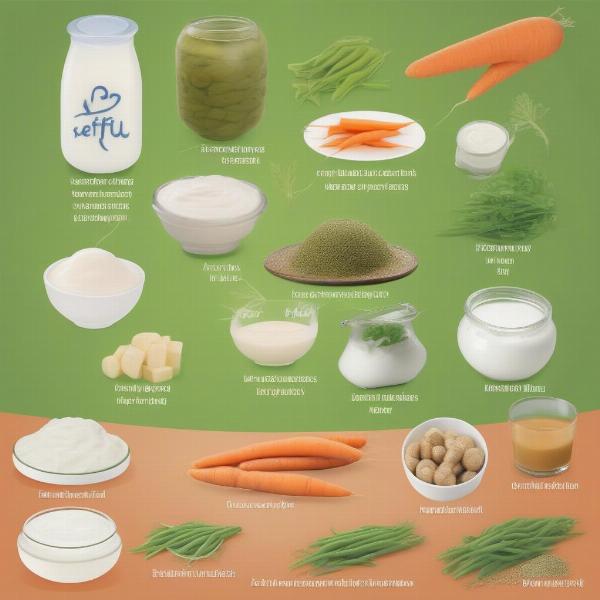Fermenators for dogs, also known as fermented food supplements, have gained popularity among pet owners seeking natural ways to enhance their furry friends’ well-being. But what exactly are they, and are they beneficial for your canine companion? This comprehensive guide delves into the world of fermenators, exploring their potential benefits, risks, and how to incorporate them safely into your dog’s diet.
Understanding Fermenators for Dogs
Fermenators are essentially food products that have undergone a controlled fermentation process. This process involves the use of beneficial bacteria or yeasts, like Lactobacillus, to break down carbohydrates and other components in the food. This breakdown results in the production of various byproducts, such as lactic acid, which can alter the food’s nutritional profile and potentially offer health advantages. For dogs, fermenators can be added to their regular diet in the form of powders, pastes, or pre-made fermented treats.
 Fermented food options for dogs
Fermented food options for dogs
Potential Benefits of Fermenators for Dogs
Many proponents of fermenators for dogs believe they can contribute positively to canine health in several ways. Some of the potential benefits include:
- Improved Digestion: The probiotics in fermenators can help populate the gut with beneficial bacteria, potentially aiding in digestion and nutrient absorption. This can be particularly helpful for dogs with sensitive stomachs or digestive issues.
- Enhanced Immune System: A healthy gut is often linked to a stronger immune system. The probiotics in fermenators may contribute to overall immune function.
- Increased Nutrient Bioavailability: The fermentation process can break down certain compounds in food, making it easier for dogs to access and absorb essential nutrients.
Risks and Considerations of Using Fermenators for Dogs
While fermenators hold promise, it’s essential to be aware of potential risks and proceed with caution:
- Digestive Upset: Introducing fermenators too quickly or in large amounts can cause temporary digestive issues like gas, bloating, or diarrhea.
- Food Sensitivities: Some dogs might be allergic or intolerant to certain ingredients commonly used in fermenators.
- Product Quality: Not all fermenator products are created equal. It’s crucial to choose high-quality products from reputable sources to ensure safety and efficacy.
How to Introduce Fermenators to Your Dog’s Diet
If you’re considering adding fermenators to your dog’s diet, it’s best to start slowly and monitor their reaction closely. Begin by offering a small amount and gradually increase the dosage over time, if tolerated well. Consult with your veterinarian before introducing any new supplements, especially if your dog has pre-existing health conditions.
What to Look for in a Fermenator Product
Choosing a high-quality fermenator for your dog is paramount. Look for products that:
- Contain a diverse range of beneficial bacteria strains
- Are free from artificial additives, preservatives, and fillers
- Are specifically formulated for dogs
Conclusion
Fermenators for dogs offer a potential avenue for enhancing digestive health and overall well-being. However, it’s essential to approach their use with caution, awareness, and guidance from your veterinarian. By choosing quality products and introducing them gradually, you can increase the likelihood of a positive experience for your canine companion.
FAQ
- Are fermenators suitable for all dogs? While many dogs can benefit from fermenators, it’s always best to consult your veterinarian before introducing any new supplements, especially if your dog has existing health conditions.
- What are the signs of a negative reaction to fermenators? Watch for signs like gas, bloating, diarrhea, or vomiting. If you observe any of these, discontinue use and consult your veterinarian.
- Can I make fermenators at home? While possible, homemade fermenators require careful preparation to ensure safety and avoid harmful bacterial growth.
- How much fermenator should I give my dog? Start with a small amount and gradually increase based on your dog’s individual needs and tolerance. Follow product instructions and consult your vet.
- Where can I buy high-quality fermenators for my dog? Reputable pet stores and online retailers specializing in natural pet products often carry high-quality fermenators.
- Are fermenators a substitute for a balanced diet? No. Fermenators should be considered a supplement, not a replacement for a complete and balanced diet.
- How long does it take to see results from using fermenators? The effects of fermenators can vary depending on the individual dog and the specific product. Some pet owners report seeing improvements in digestion within a few weeks.
ILM Dog is a leading international online resource dedicated to providing dog owners with expert advice and information on all aspects of canine care. We cover a wide range of topics, from breed selection and health to training, nutrition, grooming, and product recommendations. For more insights on dog health and nutrition, visit our website at ILM Dog or contact us at [email protected] or +44 20-3965-8624.